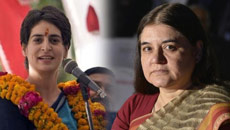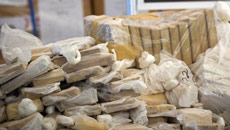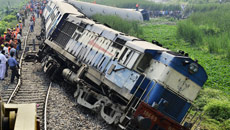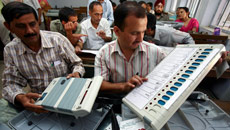An estimated 116 million people voted peacefully Thursday in the critical sixth round of parliamentary election to pick 121 MPs from 12 states, officials said.
Barring stray incidents of violence and intimidation, the gigantic exercise involving 1,767 contestants across the length and breadth of the country passed off smoothly, the Election Commission said.
"Polling was generally peaceful and incident free," Deputy Election Commissioner Vinod Zutshi said after 11 hours of hectic polling ended at 6 p.m. Only in Manipur, balloting finished two hours earlier.
Polling percentages varied from a high of around 80 in West Bengal to 54 in Madhya Pradesh.
"After today's phase, a large section of India has already voted," said BJP's prime ministerial candidate Narendra Modi. "People have voted in the heat and have voted for a strong government."
He added that the long queues of first-time and women voters "are positive steps".
Maoist guerrillas struck in Jharkhand, exploding a land mine at Bokaro in Giridih constituency and injuring four paramilitary troopers. They also blew up a school building and a rail track.
Allegations of voter intimidation came from parts of Bihar and West Bengal. The Election Commission ordered repolling in nine polling stations in Bihar.
Throughout the day, most of the 225,387 polling centres saw long queues of men and women of all age groups eager to vote. In most states, there was more voting compared to 2009.
Thursday's election covered a vast part of the Indian landscape -- from Jammu and Kashmir in the north to Karnataka in the south, from Maharashtra along the west coast to West Bengal in the east.
Polling took place in all 28 Lok Sabha seats in Karnataka, 20 of the 25 in Rajasthan, 19 of the 48 in Maharashtra, 11 seats each in Odisha and Uttar Pradesh, 10 in Madhya Pradesh, seven in Bihar, six in Jharkhand, four in West Bengal, three in Chhattisgarh and one seat each in Manipur and Jammu and Kashmir.
Simultaneous balloting was held for 77 of the 147 assembly seats in Odisha and two assembly bypolls in West Bengal.
With Thursday's round, polling has been completed in 232 of the 543 seats in the Lok Sabha.
Thursday saw the largest number of Lok Sabha seats in contention on any one day since the staggered balloting started April 7. Four more rounds of voting are due until May 12. The result will be declared May 16.
Thursday was important both for the BJP and the Congress, which held 40 and 36 of the Lok Sabha seats that went to the polls, as well as the Janata Dal-United, Jharkhand Mukti Morcha, Janata Dal-Secular, Shiv Sena, Maharashtra Navnirman Sena, Aam Aadmi Party, Biju Janata Dal, Samajwadi Party, Bahujan Samaj Party and Trinamool Congress.
The BJP claimed it was confident of winning most seats contested Thursday.
"We are sure of winning all 25 seats (in Rajasthan)," Chief Minister Vasundhara Raje said in Jaipur.
Former central minister Ananth Kumar voiced confidence about the BJP's ability to do well in Karnataka, where it is the main opposition party to the ruling Congress.
Central ministers Sushilkumar Shinde and Jyotiraditya Scindia brushed aside the BJP's claims.
"There is no Modi wave," Scindia said after voting in Guna in Madhya Pradesh. Shinde said in Sholapur: "There is no Modi wave here, only Shinde wave."
Prominent candidates in the fray included Ananth Kumar and Nandan Nilekani (Bangalore South), Jaswant Singh (Barmer), Sachin Pilot (Ajmer), Ashok Chavan (Nanded), Misha Bharti (Pataliputra), Supriya Sule (Baramati), B.S. Yeddyurappa (Shimoga), Ghulam Nabi Azad (Udhampur), Maneka Gandhi (Pilibhit), Shatrughan Sinha (Patna Sahib), M. Veerappa Moily (Chikkaballapur), Sushilkumar Shinde (Solapur), V. Balakrishnan (Banglaore Central), and S.S. Ahluwalia and Bhaichung Bhutia (Darjeeling).
About 1.37 million staff oversaw the polling, watched over by hundreds of thousands of police and paramilitary personnel.





